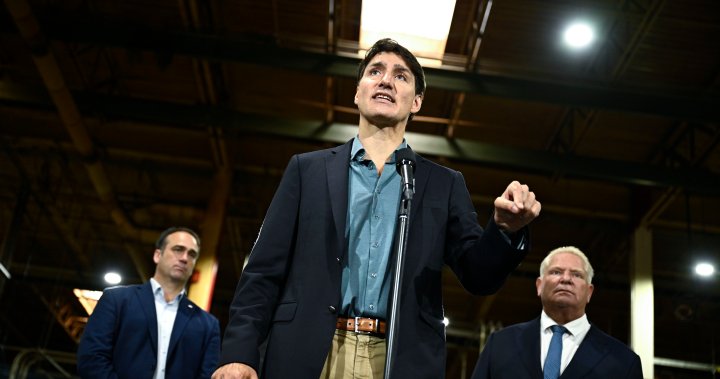Prime Minister Justin Trudeau criticized Conservative Leader Pierre Poilievre’s pledge to raise tariffs on Chinese electric vehicles by 100 per cent, accusing him of seeking a political angle. Trudeau also claimed that if Poilievre were elected, he would cut investments in Canada’s EV industry, which receives significant government subsidies. The Liberal government is considering matching U.S. tariffs on Chinese EVs and is expected to make a decision soon, with Trudeau stating that action is necessary, such as introducing a surtax. The Department of Finance recently completed a consultation process on the issue, following calls from the Ontario government and the Canadian automotive industry to increase tariffs on Chinese EVs.
Trudeau defended his government’s efforts in supporting Canada’s EV industry, highlighting ongoing initiatives to build a supply chain and invest in the sector. He criticized Poilievre’s EV strategy as unnecessary and accused him of trying to take credit for existing initiatives. Trudeau made these remarks during a funding announcement in Napanee, Ontario, where Goodyear Canada, Ottawa, and Ontario pledged over half a billion dollars to modernize a plant producing EV tires. The parliamentary budget officer estimates that the federal and provincial governments have invested up to $52.5 billion in the EV sector, with deals such as the $13.2 billion subsidy for batteries from Volkswagen in St. Thomas, Ontario, and a $15 billion agreement with Stellantis for a plant in Windsor.
Poilievre has been vocal in calling for a 100 per cent tariff hike on Chinese EVs, as well as increased levies on Chinese steel and aluminum. He has accused Trudeau of failing to protect Canadian workers from China’s aggressive economic tactics, particularly in the steel, aluminum, and automotive industries. Poilievre’s criticisms come amid growing concerns about China’s impact on Canadian manufacturing and jobs. The Conservative leader made these comments during a visit to a steel plant in Hamilton, where he emphasized the need for stronger action to counter China’s economic predation.
The ongoing debate over tariffs on Chinese EVs reflects broader tensions between political parties on how to address economic challenges and protect Canadian industries. Trudeau and Poilievre have differing approaches to supporting the EV sector, with Trudeau emphasizing government investments and subsidies, while Poilievre calls for higher tariffs and protectionist measures. The decision on whether to match U.S. tariffs on Chinese EVs is expected to have significant implications for the Canadian automotive industry and trade relations with China. Both leaders are positioning themselves as advocates for Canadian workers and the domestic manufacturing sector, with contrasting views on how to best achieve these goals.
The issue of tariffs on Chinese EVs is part of a larger discussion on Canada’s economic strategy and trade policies, particularly in the context of increasing competition and challenges from global powers like China. The government’s decision on tariffs will impact not only the EV industry but also related sectors such as steel, aluminum, and manufacturing. The debate highlights the importance of balancing domestic interests with international trade considerations and responding to evolving economic dynamics. As the election approaches, the topic of tariffs and support for Canadian industries is likely to remain a focal point for political discussions and policy debates. Both Trudeau and Poilievre are vying for support from voters by presenting their respective approaches to economic issues, including the protection of Canadian jobs and industries.
Overall, the discussion surrounding tariffs on Chinese EVs reflects broader issues related to economic policy, trade relations, and industrial development in Canada. Trudeau and Poilievre offer contrasting visions for how to support the EV industry and protect Canadian workers from external economic challenges, particularly from China. The upcoming decision on tariffs will have significant implications for the Canadian economy and the future of the automotive sector. As both leaders continue to stake their positions on this issue, Canadians will be looking to see how their policies will address the pressing concerns of job security, industrial competitiveness, and economic sustainability in a rapidly changing global landscape.













